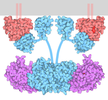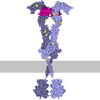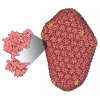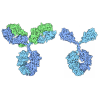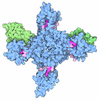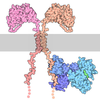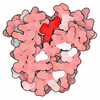+ Open data
Open data
- Basic information
Basic information
| Entry | Database: PDB / ID: 6x35 | ||||||
|---|---|---|---|---|---|---|---|
| Title | Pig R615C RyR1 in complex with CaM, EGTA (class 1, open) | ||||||
 Components Components |
| ||||||
 Keywords Keywords | TRANSPORT PROTEIN/ISOMERASE/CALCIUM BINDING PROTEIN / receptor / calcium / channel / complex / TRANSPORT PROTEIN-ISOMERASE-CALCIUM BINDING PROTEIN complex | ||||||
| Function / homology |  Function and homology information Function and homology informationpositive regulation of sequestering of calcium ion / cyclic nucleotide binding / negative regulation of calcium-mediated signaling / negative regulation of insulin secretion involved in cellular response to glucose stimulus / negative regulation of release of sequestered calcium ion into cytosol / neuronal action potential propagation / insulin secretion involved in cellular response to glucose stimulus / CaM pathway / Cam-PDE 1 activation / Sodium/Calcium exchangers ...positive regulation of sequestering of calcium ion / cyclic nucleotide binding / negative regulation of calcium-mediated signaling / negative regulation of insulin secretion involved in cellular response to glucose stimulus / negative regulation of release of sequestered calcium ion into cytosol / neuronal action potential propagation / insulin secretion involved in cellular response to glucose stimulus / CaM pathway / Cam-PDE 1 activation / Sodium/Calcium exchangers / Reduction of cytosolic Ca++ levels / Calmodulin induced events / response to redox state / protein maturation by protein folding / CREB1 phosphorylation through the activation of CaMKII/CaMKK/CaMKIV cascasde / Activation of Ca-permeable Kainate Receptor / Loss of phosphorylation of MECP2 at T308 / 'de novo' protein folding / CREB1 phosphorylation through the activation of Adenylate Cyclase / PKA activation / organelle localization by membrane tethering / negative regulation of high voltage-gated calcium channel activity / CaMK IV-mediated phosphorylation of CREB / autophagosome membrane docking / mitochondrion-endoplasmic reticulum membrane tethering / Glycogen breakdown (glycogenolysis) / positive regulation of cyclic-nucleotide phosphodiesterase activity / negative regulation of heart rate / negative regulation of calcium ion export across plasma membrane / CLEC7A (Dectin-1) induces NFAT activation / Activation of RAC1 downstream of NMDARs / regulation of cardiac muscle cell action potential / FK506 binding / positive regulation of ryanodine-sensitive calcium-release channel activity / regulation of cell communication by electrical coupling involved in cardiac conduction / positive regulation of axon regeneration / Synthesis of IP3 and IP4 in the cytosol / negative regulation of peptidyl-threonine phosphorylation / Negative regulation of NMDA receptor-mediated neuronal transmission / Phase 0 - rapid depolarisation / Unblocking of NMDA receptors, glutamate binding and activation / negative regulation of ryanodine-sensitive calcium-release channel activity / adenylate cyclase activator activity / protein phosphatase activator activity / channel regulator activity / RHO GTPases activate PAKs / Ion transport by P-type ATPases / : / Uptake and function of anthrax toxins / Long-term potentiation / Regulation of MECP2 expression and activity / Calcineurin activates NFAT / catalytic complex / DARPP-32 events / regulation of cardiac muscle contraction / detection of calcium ion / smooth muscle contraction / Smooth Muscle Contraction / response to vitamin E / regulation of ryanodine-sensitive calcium-release channel activity / cellular response to interferon-beta / RHO GTPases activate IQGAPs / calcium channel inhibitor activity / regulation of cardiac muscle contraction by regulation of the release of sequestered calcium ion / eNOS activation / Protein methylation / voltage-gated potassium channel complex / regulation of release of sequestered calcium ion into cytosol by sarcoplasmic reticulum / Activation of AMPK downstream of NMDARs / T cell proliferation / Ion homeostasis / Tetrahydrobiopterin (BH4) synthesis, recycling, salvage and regulation / : / titin binding / positive regulation of protein autophosphorylation / regulation of calcium-mediated signaling / release of sequestered calcium ion into cytosol / sperm midpiece / regulation of cytosolic calcium ion concentration / sarcoplasmic reticulum membrane / calcium channel complex / substantia nigra development / Ras activation upon Ca2+ influx through NMDA receptor / sarcomere / regulation of heart rate / FCERI mediated Ca+2 mobilization / FCGR3A-mediated IL10 synthesis / protein serine/threonine kinase activator activity / VEGFR2 mediated vascular permeability / regulation of cytokinesis / VEGFR2 mediated cell proliferation / Antigen activates B Cell Receptor (BCR) leading to generation of second messengers / positive regulation of peptidyl-threonine phosphorylation / peptidylprolyl isomerase / spindle microtubule / Translocation of SLC2A4 (GLUT4) to the plasma membrane / peptidyl-prolyl cis-trans isomerase activity / positive regulation of receptor signaling pathway via JAK-STAT / RAF activation / calcium-mediated signaling Similarity search - Function | ||||||
| Biological species |  Homo sapiens (human) Homo sapiens (human) | ||||||
| Method | ELECTRON MICROSCOPY / single particle reconstruction / cryo EM / Resolution: 4.2 Å | ||||||
 Authors Authors | Woll, K.W. / Haji-Ghassemi, O. / Van Petegem, F. | ||||||
| Funding support | 1items
| ||||||
 Citation Citation |  Journal: Nat Commun / Year: 2021 Journal: Nat Commun / Year: 2021Title: Pathological conformations of disease mutant Ryanodine Receptors revealed by cryo-EM. Authors: Kellie A Woll / Omid Haji-Ghassemi / Filip Van Petegem /  Abstract: Ryanodine Receptors (RyRs) are massive channels that release Ca from the endoplasmic and sarcoplasmic reticulum. Hundreds of mutations are linked to malignant hyperthermia (MH), myopathies, and ...Ryanodine Receptors (RyRs) are massive channels that release Ca from the endoplasmic and sarcoplasmic reticulum. Hundreds of mutations are linked to malignant hyperthermia (MH), myopathies, and arrhythmias. Here, we explore the first MH mutation identified in humans by providing cryo-EM snapshots of the pig homolog, R615C, showing that it affects an interface between three solenoid regions. We also show the impact of apo-calmodulin (apoCaM) and how it can induce opening by bending of the bridging solenoid, mediated by its N-terminal lobe. For R615C RyR1, apoCaM binding abolishes a pathological 'intermediate' conformation, distributing the population to a mixture of open and closed channels, both different from the structure without apoCaM. Comparisons show that the mutation primarily affects the closed state, inducing partial movements linked to channel activation. This shows that disease mutations can cause distinct pathological conformations of the RyR and facilitate channel opening by disrupting interactions between different solenoid regions. | ||||||
| History |
|
- Structure visualization
Structure visualization
| Movie |
 Movie viewer Movie viewer |
|---|---|
| Structure viewer | Molecule:  Molmil Molmil Jmol/JSmol Jmol/JSmol |
- Downloads & links
Downloads & links
- Download
Download
| PDBx/mmCIF format |  6x35.cif.gz 6x35.cif.gz | 2.5 MB | Display |  PDBx/mmCIF format PDBx/mmCIF format |
|---|---|---|---|---|
| PDB format |  pdb6x35.ent.gz pdb6x35.ent.gz | Display |  PDB format PDB format | |
| PDBx/mmJSON format |  6x35.json.gz 6x35.json.gz | Tree view |  PDBx/mmJSON format PDBx/mmJSON format | |
| Others |  Other downloads Other downloads |
-Validation report
| Summary document |  6x35_validation.pdf.gz 6x35_validation.pdf.gz | 1011.4 KB | Display |  wwPDB validaton report wwPDB validaton report |
|---|---|---|---|---|
| Full document |  6x35_full_validation.pdf.gz 6x35_full_validation.pdf.gz | 1.1 MB | Display | |
| Data in XML |  6x35_validation.xml.gz 6x35_validation.xml.gz | 333.5 KB | Display | |
| Data in CIF |  6x35_validation.cif.gz 6x35_validation.cif.gz | 533.5 KB | Display | |
| Arichive directory |  https://data.pdbj.org/pub/pdb/validation_reports/x3/6x35 https://data.pdbj.org/pub/pdb/validation_reports/x3/6x35 ftp://data.pdbj.org/pub/pdb/validation_reports/x3/6x35 ftp://data.pdbj.org/pub/pdb/validation_reports/x3/6x35 | HTTPS FTP |
-Related structure data
| Related structure data |  22018MC  6w1nC  6x32C  6x33C  6x34C  6x36C M: map data used to model this data C: citing same article ( |
|---|---|
| Similar structure data |
- Links
Links
- Assembly
Assembly
| Deposited unit | 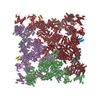
|
|---|---|
| 1 |
|
- Components
Components
| #1: Protein | Mass: 11939.562 Da / Num. of mol.: 4 Source method: isolated from a genetically manipulated source Source: (gene. exp.)  Homo sapiens (human) / Gene: FKBP1B, FKBP12.6, FKBP1L, FKBP9, OTK4 / Production host: Homo sapiens (human) / Gene: FKBP1B, FKBP12.6, FKBP1L, FKBP9, OTK4 / Production host:  #2: Protein | Mass: 423654.469 Da / Num. of mol.: 4 / Source method: isolated from a natural source / Source: (natural)  #3: Protein | Mass: 16723.365 Da / Num. of mol.: 4 Source method: isolated from a genetically manipulated source Source: (gene. exp.)  Homo sapiens (human) / Gene: CALM1, CALM, CAM, CAM1 / Production host: Homo sapiens (human) / Gene: CALM1, CALM, CAM, CAM1 / Production host:  #4: Chemical | ChemComp-ZN / Has ligand of interest | N | |
|---|
-Experimental details
-Experiment
| Experiment | Method: ELECTRON MICROSCOPY |
|---|---|
| EM experiment | Aggregation state: PARTICLE / 3D reconstruction method: single particle reconstruction |
- Sample preparation
Sample preparation
| Component |
| ||||||||||||||||||||||||||||||
|---|---|---|---|---|---|---|---|---|---|---|---|---|---|---|---|---|---|---|---|---|---|---|---|---|---|---|---|---|---|---|---|
| Source (natural) |
| ||||||||||||||||||||||||||||||
| Source (recombinant) |
| ||||||||||||||||||||||||||||||
| Buffer solution | pH: 7.5 | ||||||||||||||||||||||||||||||
| Specimen | Embedding applied: NO / Shadowing applied: NO / Staining applied: NO / Vitrification applied: YES | ||||||||||||||||||||||||||||||
| Specimen support | Details: unspecified | ||||||||||||||||||||||||||||||
| Vitrification | Cryogen name: ETHANE |
- Electron microscopy imaging
Electron microscopy imaging
| Experimental equipment |  Model: Titan Krios / Image courtesy: FEI Company |
|---|---|
| Microscopy | Model: FEI TITAN KRIOS |
| Electron gun | Electron source:  FIELD EMISSION GUN / Accelerating voltage: 300 kV / Illumination mode: OTHER FIELD EMISSION GUN / Accelerating voltage: 300 kV / Illumination mode: OTHER |
| Electron lens | Mode: DIFFRACTION |
| Image recording | Electron dose: 50 e/Å2 / Film or detector model: FEI FALCON III (4k x 4k) |
- Processing
Processing
| EM software | Name: PHENIX / Version: dev-3714 / Category: 3D reconstruction |
|---|---|
| CTF correction | Type: NONE |
| 3D reconstruction | Resolution: 4.2 Å / Resolution method: FSC 0.143 CUT-OFF / Num. of particles: 25122 / Symmetry type: POINT |
 Movie
Movie Controller
Controller









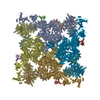
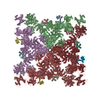
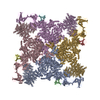
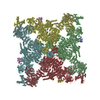

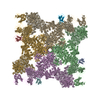
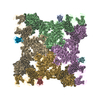

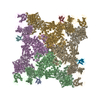
 PDBj
PDBj







